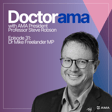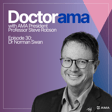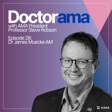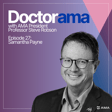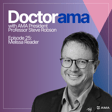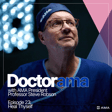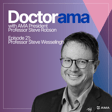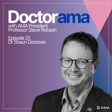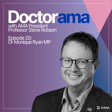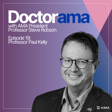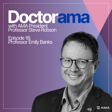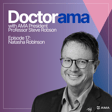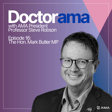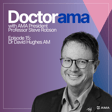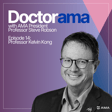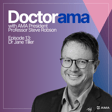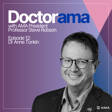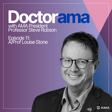Become a Creator today!Start creating today - Share your story with the world!
Start for free
00:00:00
00:00:01

Episode 24 - Professor Greg Hunt
In episode 24 of Doctorama AMA President Professor Steve Robson chats with Professor Greg Hunt.
Recommended
Transcript
Podcast Introduction and Guest Introduction
00:00:00
Speaker
Well, as listeners on this podcast have heard before, being the Health Minister is no easy job. But imagine being the Federal Health Minister and having a global pandemic landed in your lap. We're going to find out what that's like today on Dr Rama. You're listening to Dr Rama with Steve Robson, bringing you the best of health, medicine and people.
00:00:27
Speaker
Well, my guest today will be well known to all of our listeners. It is now Professor Greg Hunt. Greg, welcome to
Greg Hunt's Political Journey and Influences
00:00:35
Speaker
Dr Rama. It's a pleasure to join you, Steve. Look, thanks very much. Something I just absolutely have to clear up before we go any further in the podcast is what footy team do you support? I am a Richmond Tigers fan, so we've had
00:00:51
Speaker
A long drought and then a glorious period, really, of four years, arguably five. And then it's a little challenging. We're in a rebuild phase. We're at the start of our rebuild phase, but I love the club. And I was incredibly privileged to be health minister and sports minister in 2017 when Richmond broke the drought. There's no cause for it, but I can claim that.
00:01:20
Speaker
and to be at the grand final sitting right adjacent to Peggy O'Neill and Brendan Gale and again be back in 2019. So I've been blessed. Oh, well that is fantastic. We have a divided family. My wife is Carlton. My 19-year-old daughter Poppy is Geelong and my 14-year-old son James is Passion at West Coast. Right, okay.
00:01:49
Speaker
Certainly a little bit of potential for rivalry in the family there, Greg. Yeah, I think it's a hedging strategy.
00:01:55
Speaker
Yeah, look, I guess one of the first things I always like to know from guests on this is how you ended up where you are. And I know that your father was a minister in the Victorian government. Did that have any influence on your choices of career? In fact, I'd really like to know how you got into politics. What led you in? So, look, undoubtedly it had an influence to the extent that it's the environment in which I grew up.
00:02:24
Speaker
But dad did his best to discourage me, as did my mum, from entering Parliament.
Career Phases: Development to Post-Parliament
00:02:33
Speaker
He thought it was, you know, tough and brutal and that there would be other more sort of
00:02:40
Speaker
lucrative options. But I developed a love of public policy. And so at an early age, at about age 18, I had a vision of my life across three phases. The first one was developmental, which was building skills across law, arts, to build skills in
00:03:04
Speaker
media, the physical world, in manual labour, and then in policy. And I've worked across all of those areas with my legal career being at Midra Ellison, my consulting career at McKinsey's, my parliamentary policy work.
00:03:25
Speaker
with Alexander Downer, who was a great mentor as opposition leader, shadow minister. And then really the most important part was two and a half years as his senior advisor when he was minister for foreign affairs. And, you know, stepped out of that into McKinsey and worked around the world. And so I then came into parliament
00:03:51
Speaker
When the seat in which I grew up, the Mornington Peninsula, was vacated by Peter Reath and I was lucky enough to come back from Geneva where I'd been working for McKinsey in a World Economic Forum project as their director of global strategy to be pre-selected to win the seat and then to spend just over two decades there.
00:04:15
Speaker
life story was the portfolio, the middle part to be parliament for six or seven terms in the underserved seven terms. And then a third phase, which I thought was extremely important, learning from dad, because he had struggled a bit in his post-parliamentary career to have a very clear career. And for me, that's a portfolio career of one pillar academic.
00:04:39
Speaker
Professor at Melbourne University and at University College London, one philanthropic chairing Monash's Mental Health Institute, and one commercial which is working across sort of biotech, medical, legal, private equity, largely in senior advisory roles.
Debating Skills and Political Impact
00:04:55
Speaker
So that's the life story on the career front in a nutshell. Greg, a lot of people mightn't realise that you in fact were
00:05:04
Speaker
a champion international debater in your youth. I see that in fact you were in the world debating championships. Was that a passion of yours in those days?
00:05:21
Speaker
did debating at school and we were lucky enough to win a state championship both at the team level and I was also lucky enough on the individual level. We took that to university, myself and a group of friends.
00:05:39
Speaker
I managed to lose a lot of finals. I managed to lose the Australasian final, to lose the world debating championships final with my great friend and partner Rufus Black, who's now the vice chancellor of the University of Tasmania. And he blames me and I blame me.
00:06:02
Speaker
But with a friend who's now a judge in one of the senior courts, we won the Edinburgh International Debating Tournament. And so I loved my debating and it was, of all the things I took from school and university,
00:06:22
Speaker
the most important skill because for me at least it helped me to structure, to feel confident and to understand what was needed. And what it did allow me to do was to give, to engage in more activities as a minister because I needed less preparation time and it was all about the framework and the key points and
00:06:52
Speaker
You know, it was a matter of pride and professionalism for me not to use notes giving speeches because it meant that I had to internalize and own the material.
Ministerial Roles and Challenges
00:07:05
Speaker
And the same thing in parliament other than when you're introducing legislation and in question time to own it. Now, sometimes we would have
00:07:13
Speaker
materials we would use, particularly during COVID with the daily updates to make sure the figures were absolutely right. But that early discipline became an absolutely indispensable tool for my parliamentary career. Greg, you had a number of ministerial portfolios and I'm not going to ask which was your favourite. Everybody will recognise very well from your
00:07:35
Speaker
time as the Federal Health Minister. But you've also had the portfolio of Industry, Innovation and Science and Minister for the Environment. How is, I mean, what are the things that you have to do as a minister to sort of get across a new portfolio? Because they're quite different portfolios. I'd be interested in how you go about that process of, you know, taking over a new portfolio.
00:08:01
Speaker
So environment, all up, I spent about 11 years in environment. I had two years as a parliamentary secretary, which came from the work that I had been doing as a backbencher. So seven terms in parliament, six as a frontbencher, five in shadow cabinet or cabinet. And and all of those, I had three as a cabinet minister.
00:08:31
Speaker
And then almost two terms as health minister and one as a pandemic minister. So the main thing, environment I had a long lead in because I went through, so assistant minister or parliamentary secretary. And then I had it during our entire time in opposition, so I had a really developed knowledge and plan.
00:08:58
Speaker
and so came in completely ready. And that translated pretty easily to innovation and science, which was a natural extension. But then health, I was very unprepared and I was honest about it at the time, in the sense that it was not a portfolio I had engaged with other than as a local member. And so I remember being dropped into that.
00:09:29
Speaker
There was an issue, it was January 2017. In fact, I had been in to hospital for a midlife colonoscopy and it was in January so it was a good time to do it.
00:09:44
Speaker
I was just coming out of the post-anesthetic haze and my phone rang and Malcolm Trumbull, oh yeah, how's your health? It's so good, but that's nice of you. Do you like sport? Yeah, yeah. And then I sort of went back to sleep and woke up and realized with a couple of texts that I was actually going to be the minister.
00:10:07
Speaker
And so I may well be the first person to have gone into a hospital for colonoscopy and emerged as Minister for Health. So that was actually a very stressful time. I spent three weeks going incredibly deep, but from a shallow starting point.
00:10:29
Speaker
We worked 16 hours a day for those three weeks, building knowledges of the structures, the systems, the personnel, and the issues, and then an early hypothesis. But it meant that I came to it clean and then progressively built things up, knowing that the very first thing I had to do was strike agreements with the AMA and the College of GPs.
Health Portfolio Management Strategies
00:10:52
Speaker
with the Pharmacy Guild and with Medicines Australia and the Generic Medicines Association because there were some issues and that actually became a framework for the first five months. Greg, I think one of the things that I always hear is that health, the health portfolio is characterized by a huge number of stakeholders and people like that. It's really biggest. How do you get across building the relationships with all of these different stakeholders across the sector?
00:11:21
Speaker
So you've got to work in two ways, quickly and comprehensively. Comprehensively, you know, the way that we approached this was to pretty soon we broke it up into a framework of, this is myself and my office, the four pillars of primary care, acute care, including private health insurance. We added added that in there.
00:11:49
Speaker
mental health and preventive health and medical research. And then aged care was a separate division. And within those, we identified the priorities and short, medium and long and stakeholders. And so on day one, my first two calls were to the president of the AMA.
00:12:10
Speaker
and to the president of the Royal Australian College of GPs. And then I progressively built out from there. And we would compile lists. And over those first three weeks, part of the day was going deep with the department in all areas, deep with the office. But part of it was contacting the stakeholders and getting their initial views on what was working, what was wrong, what needed to be done.
00:12:37
Speaker
And that didn't mean I adopted all of the views, but I got all of the views. And so I think we had a couple of hundred calls, which were sort of organized by my office, but I would go through them a couple of hundred calls in that first month with stakeholders across the colleges, the societies, the states, of course, speaking with all of the ministers.
00:13:07
Speaker
and getting different views as well as building the knowledge of the system. And I was blessed that I had an amazing chief of staff in Wendy Black. I had an incredible budget advisor in Nick Henry, great media team with John O'Doherty and Ben Wicks that I'd inherited. So I had these foundations, but then we built a new team internally. I had worked with the department
00:13:33
Speaker
And Glennis Beecham came on board fairly soon as the secretary. Brendan Murphy was the chief medical officer. And we had wonderful people such as Carolyn Edwards and Penny Shakespeare who were there. And we were able to, and of course, John Scarrett, so able to build off that and to lay out the foundations. And so we had a very clear initial goal
00:14:00
Speaker
of the agreements of funding in return for policy reform with the five key groups. And then in that first year, with Alex Caroly, who was also on my staff, an amazing, you know, amazing capacity, we pursued the private health agreement identifying that the two biggest risks for health were general practice shortages, particularly in rural Australia, and declining private health insurance rates.
00:14:30
Speaker
Yeah, we turned the ladder around and made progress on the former. But we really focused on stabilizing the private health system. And we were lucky enough to do that, which put it in good shape for COVID. And it's actually now in a strong position, but so much so that there needs to be a bit more of a rebalancing in my view towards the hospitals.
00:14:52
Speaker
Yeah, I worked with you on a few things that were quite memorable. We worked on the ministerial advisory committee on out-of-pocket costs. We certainly, I worked and met with you on the McKinsey's mission and I was always impressed with your mastery of detail. But the thing that really stands out for me is when you came to open
00:15:14
Speaker
the national women's health summit and you took me aside and so that i'm really itching to announce something but i haven't told my department, you know i could be cranky with me you happy if we need to refresh of the national women's health.
00:15:30
Speaker
plan and it seems sort of almost a bit mischievous at the time. How did this sort of stuff go down? Did you ever wing it and surprise the office or the department and say, look, I've just come up with this. Can we sort out the details later? This happened very often.
00:15:46
Speaker
Yes, it did. And there was a phrase in my office that he's seeking forgiveness, not permission. And, you know, there are certain rights as minister, you know, you do get to set policy directions. Now that it was more the processes that I would announce. So, you know, to work on a 10 year plan,
00:16:14
Speaker
with the Lung Foundation on respiratory health or 10 year primary care plan. Those are the things where if I felt confident, I would take a shot at goal. That's different from announcing funding for X or Y, where I was very careful to go through proper processes and to have, it was the public person. But if it's the directions for
00:16:41
Speaker
for policy. I, for example, never asked for permission from anybody to announce and to give the national apology on endometriosis because I thought I'm not going to waste going through a long process because
00:17:00
Speaker
That is ultimately within my gift and powers and responsibilities. And so I'll take that responsibility and to announce that we would work on a national endometriosis plan in the same way we did with the National Women's Health Plan.
00:17:15
Speaker
And then the results where it involved funding and other things that meant we did have to go to cabinet so those followed the processes but the ability to set. Policy directions that is actually under the constitution that rests with the minister and so if you have a constitutional power you shouldn't be afraid you just have to understand.
00:17:38
Speaker
allocation of funds that's important and probity, but a direction of policy that vests in and rests with you as minister.
Managing COVID-19: Personal and Professional Insights
00:17:47
Speaker
And so it's an art, not a science as to how far you can push that. But also, you know, I'd had prime minister say to me, well, should you have done that? And I said, yes. And they tend to leave you alone. If you are competent as a minister, they will tend to leave you alone. Greg,
00:18:07
Speaker
COVID and the pandemic was such a huge part of your portfolio. And that's how you became so well known to Australians. And there's an inquiry going on at the moment. I want to step away from the technicalities and things, because I know that you've made a submission to the inquiry. We discussed that recently. But I want to talk about the personal, because this is a once in a century event. I want to hear
00:18:35
Speaker
about the personal effects of this on you, because it's an extraordinary thing to have to face as a minister. It must have been incredibly stressful. Tell me how you coped with this. Well, it was a little busy, but I was very fortunate in that I have. I mentioned at the outset to your question the sort of three phases of my professional life. But that's not actually how I define my life.
00:19:05
Speaker
I defined it by four lifelong underpinning themes. One is friends and family. Two is values. Three is creative. And for me, I can't sing or dance or paint. I can write and speak. So that's my creative outlet.
00:19:24
Speaker
And four is the physical, and the physical is exercise, but also being outside in the physical world, where I get great joy and happiness. And so, a good day I get three of those four, a great day I get all four.
00:19:44
Speaker
Yeah, the office was aware of this. And so they would try to manage, you know, it was indispensable that we tried to always build in my exercise. Yeah, time to call my family, even if I was in Canberra and doing 18 hours. Yeah, you know, they would put white space in the diary, which, you know, was code for the time to call family and a gym session in the afternoon, they'd know I'd run in the morning between 730 and eight.
00:20:09
Speaker
So I would get up at six. I would walk into the office. I'd work for an hour, do the phone calls. I would then go for a run and then get straight back into, in the final term, when COVID was on the leadership committees, if it was a parliamentary sitting or other things. And it was a very regimented Spartan regime.
00:20:33
Speaker
And then I would basically work through with meetings, with paperwork, with meetings, plans, and then at about 4.30, try to get to the gym. But along the way, I have two or three times when I call my family if I wasn't with them. And then it didn't bother me working through to the evening. So long as I could exercise, I'd work through in a camber evening until about 10, 30 or 11.
00:20:59
Speaker
with the last two hours being clearing the paperwork, because a minister would get about 20,000 submissions a year of submissions, briefs, letters, and you have to work out, again, what you could triage quickly, what needed a deep dive, and things that needed a really deep dive, we would schedule with either the office or the department to go deep on those.
00:21:26
Speaker
And so we would literally be called ministerial deep dive on radiology rebates. And you would, where there was a thorny problem and you needed the contested views. Now on COVID, we just said
00:21:46
Speaker
This time is for COVID, this time is for health, this time is for the electorate, because you had those three hats and were very structured. And then progressively it was the electorate that missed out, and I'm sort of apologetic about that, that I spent less time on and in the electorate in the last term, but that was inevitable.
00:22:09
Speaker
we would have that very regimented system through the day. And so the general pressure I was able to cope with because I had those four outlets, that doesn't mean there weren't bad days. When the decision was made by the state chief health officers to suspend elective surgery,
00:22:31
Speaker
That was at the height of the pandemic, but also it risked the existential viability of the hospitals. And I could see up to 700 private hospitals collapsing. And that was terrifying with all the capacity that could be lost. And that was incredibly stressful. So we just kept working the problem and working the problem and
00:22:59
Speaker
Kylie Wright, who was senior advisor in the office, came up with the idea of a viability guarantee. And then Wendy Black said, well, that should actually be a national partnership then, where we bring the public and the private together. And so we're just working it. And that's what came to pass. So we fought for five days to make that happen. It was like an intense period of battle.
00:23:23
Speaker
At the same time as there was a ship off the West Australian coast, which needed to be allowed to dock to save the people, the Atanya, at the same time we were putting telehealth together, which started, you know, that was all in that five day period. So that was where the bandwidth was strained. So the biggest stress for me was when there were so many things coming in at the one time. And so sometimes I'd have to stop the ship and say, could I just have have some space?
00:23:53
Speaker
But, you know, so I never felt overwhelmed about the task. There would have been moments of being overwhelmed because of the bandwidth of multiple things at exactly the same time. But the task was motivating. Then my wife and children were unbelievable supports. My wife was an infection control nurse at the Alfred Hospital. And so she, at this stage, she wasn't, but she had
00:24:23
Speaker
kept by her bedside, Laurie Garrett's The Coming Plague, and she said to me right at the outset, she said, this could be the big one, go hard, go early. And that was same thing as Brendan Murphy said in a slightly different way. And so that guided a lot of my thinking. And we went incredibly hard, incredibly early, and that
00:24:48
Speaker
remains in my view the most important peacetime decision Australia's made since the Second World War to close the border with China, to take the initial steps, particularly when the World Health Organization was saying the opposite.
00:25:01
Speaker
Yeah. Look, I'm going to ask you something and feel free not to answer if you don't wish, but when you were looking at those initial terrifying images that we were seeing in the early stages and Zimik from overseas, and you were talking to your international counterparts, were you afraid? Were you hearing this talking, seeing what was happening? Did you think, my God, this is really scary?
00:25:29
Speaker
How did you feel? Well, the initial Doherty Institute modelling showed in an unmitigated scenario. So that's where you took a baseline and did nothing that up to 150,000 Australians could die. And the system would be overwhelmed.
00:25:46
Speaker
And pretty soon the system was overwhelmed in Milan and Madrid, New York, where many people consider it one of the cultural capitals of the world, financial capital. They were taking the dead off the streets and burying them in a mass grave on Roosevelt Island. It's just unthinkable.
00:26:06
Speaker
The systems collapsed in parts of northern Italy where doctors, your counterparts had to choose who lived and who died by getting access to ventilation. So we were totally focused, myself and Scott and the National Security Committee. And that was why we went really hard really early because we saw the projections. And we said, well, even if it's a fifth of that,
00:26:34
Speaker
That's an unimaginable loss. And so we took decisions that were almost beyond imagination. And we had to do it. There were only a couple of thousand cases when we closed the border with China. And there were a handful in Australia. And there was a certain leap of faith on medical science and a trust in our modelers. But in the end, I think they were right.
00:27:01
Speaker
and we were right, and that made the
Advice for Aspiring Politicians
00:27:03
Speaker
difference. That early comprehensive speed and focus was the difference. And this was brought home recently. There was a study by, it was called the Global Burden of Disease Study published in the Lancet at the start of March. There's about 11,000 public health researchers globally. So it's as big as any study ever. And they found that from 2019 to the end of 21,
00:27:31
Speaker
the world lost 1.6 years of average life expectancy. The US lost two years and Australia gained 0.2 years. And so if there's one figure apart from my dates of birth and death on my gravestone, that would be the one.
00:27:50
Speaker
Greg, I'm going to finish up here. It's an extraordinary story. And I think I might like to talk to you again if we've got time in the near future. But I'm going to ask a broader question. If a young person comes to you and says, look, I'm interested in a career in politics, what advice would you give them? Is it a great career? What would you say to someone who's thinking about a career in politics? My answer is overwhelmingly to encourage them.
00:28:20
Speaker
and to support them and to say, there's a high road and a low road. And this is what I got from my father. I always had a very positive impact because he was not interested in politics. He said he was a parliamentarian. And I tried never to use the term politician. I always said parliamentarian. And I have taught everyone I know that they should see themselves as parliamentarian.
00:28:49
Speaker
And that's about fealty to the notion of the parliament. And so I think there is great nobility in it as a vocation. And there's nowhere where you can have as much collective influence. Look, if you are a Nobel laureate who creates a new treatment, if you creation of immunotherapy, yes.
00:29:12
Speaker
But as a general rule, the capacity to influence more lives in a positive way is there, as well as the capacity to influence individual lives. So I loved the diversity of the job, the challenge of the role, but my advice is also it's tough and it's brutal and if
00:29:34
Speaker
you are troubled by being insulted or abused, then it's not the place for you. You've got to be able to remove yourself from the environment. It's like you don't take it personally if you're opening the batting for Australia and somebody bowls, bounces at you at 142 kilometres an hour. You've got to be able to evade them, but you can't feel aggrieved that they're bowling fast and short at you. That is what happens when you're opening the batting for Australia.
00:30:05
Speaker
if you are on the floor of the parliament in question time, then you are at the, in the national parliament, you're at the peak of that vocation. And it's tough. Now, whether it should or shouldn't be, that's a reality. So that was my view. And then the other thing is, of course, you get to meet with everybody. And I will take this opportunity to say thank you in particular to the medical profession.
00:30:33
Speaker
doctors and nurses, aged care workers, pharmacists, radiologists, pathologists, oh, the work that our pathologists did during COVID, hospital administrators, for what they did during COVID. So those figures that 0.2 years increase in life expectancy as opposed to a 1.6 year decrease,
00:30:57
Speaker
that belongs to the whole of the medical profession in Australia. And so it is a chance that they thank you. And you say, why would I ever recommend parliamentary life? It's because you are imbued with the responsibility to deal with the big things. You get a chance to work on Mackenzie's mission or other great projects. But in that moment,
00:31:23
Speaker
Ultimately, if that is what you want and you feel it fits you, then responsibility for the great challenges and decisions vests in the ministerial office and ultimately in the holder and the way that
00:31:38
Speaker
it does in the Prime Minister above all else. And you get to work with incredible people. And that was the blessing of coming into health. I got to work with the most extraordinary people at the most extraordinary time. Greg, it is always a great pleasure speaking with you. I'm sure we'll speak again soon.
Conclusion and Gratitude
00:31:58
Speaker
And thanks so much for joining me on Dr Rama.
00:32:10
Speaker
You've been listening to Dr Rama, a podcast produced on Ngunnawal country by the Australian Medical Association. All rights reserved.
